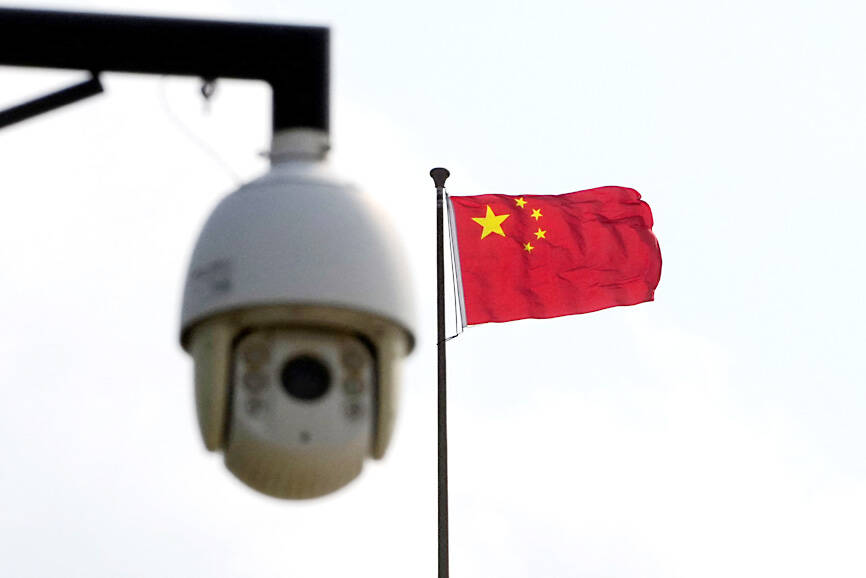A Taiwanese has been detained and interrogated in China on suspicion of spreading and developing the religion of I-Kuan Tao (一貫道), an official familiar with the issue said.
I-Kuan Tao has been developing in Taiwan for years and has attracted millions of followers internationally, including some Taiwanese businesspeople based in China, the source said.
The Chinese Communist Party (CCP) vigorously suppressed I-Kuan Tao in the early days of its rule, but later became more tolerant of its development in China and did not label it a cult like Falun Gong (法輪功), the source said.

Photo: Reuters
However, the Chinese government has begun to keep a close eye on the Taiwanese I-Kuan Tao organizations in China since the beginning of Chinese President Xi Jinping’s (習近平) third term, they said.
Beijing continues to interrogate and find faults with Taiwanese traveling to China and repeatedly violates the personal safety of Taiwanese I-Kuan Tao followers, the source said.
The government received a report from a follower, who said that when entering China, they were detained and interrogated by the Chinese authorities for several days without warning, he said.
The follower was annoyed about being subjected to an investigation while they had done nothing illegal, he said.
It was unusual for Beijing to accuse Taiwanese travelers of spreading and developing I-Kuan Tao and to look into their past activities in China and their membership in Line groups on phones, the source said.
Taiwanese government information shows that Chinese officials have often accused Taiwanese religious figures of using secret religious societies, cult organizations and superstitions to undermine law enforcement, which carries severe penalties.
For example, a I-Kuan Tao follower was imprisoned by China for carrying dozens of scriptures. Another Taiwanese was suppressed by Chinese authorities for promoting Kuanyin Buddhism (觀音法門) in China.
Beijing used to be lenient with I-Kuan Tao activities, which were allowed as long as they were reported in advance and had no Chinese participators, he said.
The CCP is growing more wary of organized civil activities, he said.
The tightly knit organization and relatively secretive meetings of I-Kuan Tao is causing serious concerns for Chinese officials, who have ended up tightening controls considerably, he said.
Beijing maintains a bottom line for everything. In this case, no Chinese citizens can take part in I-Kuan Tao activities, the source said.
The bottom line now appears to be extreme, leading to complete bans on every matter of concern, he said, warning that Taiwanese religious figures should be careful when traveling to China.

POSITIVE DEVELOPMENT: Japan and the US are expected to hold in-depth discussions on Taiwan-related issues during the meeting next month, Japanese sources said The holding of a Japan-US leaders’ meeting ahead of US President Donald Trump’s visit to China is positive news for Taiwan, former Japan-Taiwan Exchange Association representative Hiroyasu Izumi said yesterday. After the Liberal Democratic Party’s landslide victory in Japan’s House of Representatives election, Japanese Prime Minister Sanae Takaichi is scheduled to visit the US next month, where she is to meet with Trump ahead of the US president’s planned visit to China from March 31 to April 2 for a meeting with Chinese President Xi Jinping (習近平). Japan and the US are expected to hold in-depth discussions on Taiwan-related issues during the

‘LIKE-MINDED PARTNER’: Tako van Popta said it would be inappropriate to delay signing the deal with Taiwan because of China, adding he would promote the issue Canadian senators have stressed Taiwan’s importance for international trade and expressed enthusiasm for ensuring the Taiwan-Canada trade cooperation framework agreement is implemented this year. Representative to Canada Harry Tseng (曾厚仁) in an interview with the Central News Agency (CNA) said he was increasingly uneasy about Ottawa’s delays in signing the agreement, especially as Ottawa has warmed toward Beijing. There are “no negotiations left. Not only [is it] initialed, we have three versions of the text ready: English, French and Mandarin,” Tseng said. “That tells you how close we are to the final signature.” Tseng said that he hoped Canadian Prime Minister Mark Carney

President William Lai (賴清德) yesterday bestowed one of Taiwan’s highest honors on Saint Vincent and the Grenadines (SVG) Ambassador Andrea Clare Bowman in recognition of her contributions to bilateral ties. “By conferring the Order of Brilliant Star with Grand Cordon on Ambassador Bowman today, I want to sincerely thank her, on behalf of the Taiwanese people, for her outstanding contribution to deepening diplomatic ties between Taiwan and SVG,” Lai said at a ceremony held at the Presidential Office in Taipei. He noted that Bowman became SVG’s first ambassador to Taiwan in 2019 and

A man walks past elementary school artworks at the Taipei Lantern Festival in Ximen District yesterday, the first day of the event. The festival is to run from 5pm to 10pm through March 15.